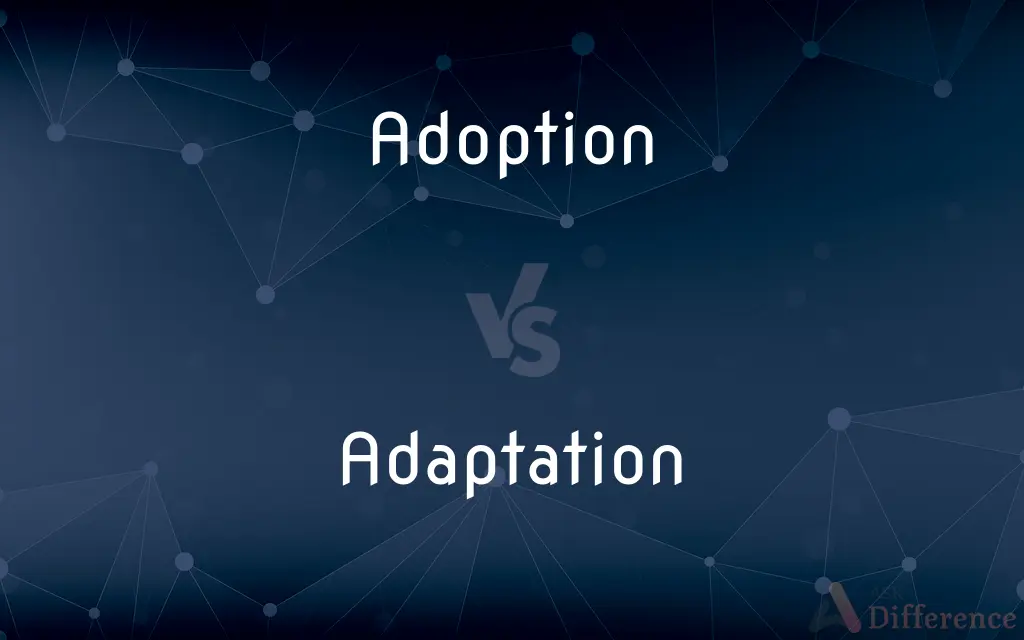Adoption vs. Adaptation — What's the Difference?
Edited by Tayyaba Rehman — By Fiza Rafique — Updated on September 22, 2023
Adoption refers to the act of accepting or taking on something new, such as a child, idea, or technology. Adaptation involves modifying or changing something to better fit a new environment or situation.

Difference Between Adoption and Adaptation
Table of Contents
ADVERTISEMENT
Key Differences
Adoption is primarily about taking something into one's life, whether it be a child, pet, or new technology. It implies a legal or formal process of incorporating something new into one's existing structure. Adoption is often a conscious decision made after careful thought and preparation.
Adaptation, in contrast, involves making adjustments or modifications to something in order to make it more suitable for a particular condition or environment. It is a more dynamic process and may involve trial and error. Adaptation often happens organically over time as circumstances change.
In Adoption, one typically assumes responsibility for the care, upbringing, or management of the adopted entity. The term can be applied in various contexts, like adopting a child or even adopting a new policy in a corporation.
In Adaptation, the focus is not on responsibility but on change and flexibility. Whether it is adapting to a new culture, adapting a book into a movie, or a species adapting to a new environment, the emphasis is on modifying or transforming to fit into new conditions.
Both Adoption and Adaptation can happen at different levels—individual, societal, or even species level. However, adoption is generally more focused on integration, while adaptation zeroes in on change and survival.
ADVERTISEMENT
Comparison Chart
Focus
Taking in, assuming responsibility
Changing, modifying
Process
Usually formal or legal
Dynamic, may involve trial and error
Application
Various contexts: families, technology, policy
Various: culture, biology, literature
Temporal Aspect
Generally a one-time event
Ongoing process
Associated Terms
Adopter, adoptive
Adapter, adaptive
Compare with Definitions
Adoption
To choose or elect someone or something.
The adoption of the new mascot was well-received.
Adaptation
Adjusting to a new cultural environment.
Cultural adaptation can be challenging.
Adoption
Acceptance and implementation of new technology or system.
The company is considering the adoption of cloud services.
Adaptation
Altering something to fit new conditions.
The adaptation of the novel into a movie was successful.
Adoption
The act of taking someone else's child into one's family.
The adoption of a child requires legal paperwork.
Adaptation
Biological change in response to environmental factors.
Darwin studied the adaptation of finches.
Adoption
Assumption of new practices or beliefs.
The adoption of veganism is increasing.
Adaptation
A revised version of a text or performance.
I enjoyed the theatrical adaptation of the book.
Adoption
A formal decision to accept something.
The adoption of the new policy was unanimous.
Adaptation
Making modifications in structure or habits.
Architectural adaptation is common in old buildings.
Adoption
Adoption is a process whereby a person assumes the parenting of another, usually a child, from that person's biological or legal parent or parents. Legal adoptions permanently transfer all rights and responsibilities, along with filiation, from the biological parent or parents.
Adaptation
In biology, adaptation has three related meanings. Firstly, it is the dynamic evolutionary process that fits organisms to their environment, enhancing their evolutionary fitness.
Adoption
To take on the legal responsibilities as parent of (a child that is not one's biological child).
Adaptation
The act or process of adapting.
Adoption
To become the owner or caretaker of (a pet, especially one from a shelter).
Adaptation
The state of being adapted.
Adoption
To take and follow (a course of action, for example) by choice or assent
Adopt a new technique.
Adaptation
Something, such as a device or mechanism, that is changed or changes so as to become suitable to a new or special application or situation.
Adoption
To take up and make one's own
Adopt a new idea.
Adaptation
A composition that has been recast into a new form
The play is an adaptation of a short novel.
Adoption
To move to or resettle in (a place).
Adaptation
Change or adjustment in structure or habits by which a species becomes better able to function in its environment, occurring through the course of evolution by means of natural selection.
Adoption
To take on or assume
Adopted an air of importance.
Adaptation
A structure or habit that results from this process.
Adoption
To vote to accept
Adopt a resolution.
Adaptation
(Physiology) The responsive adjustment of a sense organ, such as the eye, to varying conditions, such as light intensity.
Adoption
To choose as standard or required in a course
Adopt a new line of English textbooks.
Adaptation
Change in behavior of a person or group in response to new or modified surroundings.
Adoption
The act of adopting. en
Adaptation
(uncountable) The process of adapting something or becoming adapted to a situation; adjustment, modification.
Adoption
The state of being adopted; the acceptance of a child of other parents as if he or she were one's own child.
A Chinese baby girl was given away for adoption.
Another Chinese boy was put up for adoption.
Adaptation
(countable) A change that is made or undergone to suit a condition or environment.
Adoption
Admission to an institution, for example a hospital, clinic, mental asylum.
The adoption of people into hospitals or monasteries
Adaptation
The process of change that an organism undergoes to be better suited to its environment.
Adoption
The choosing and making that to be one's own which originally was not so; acceptance
The adoption of opinions
The adoption of words from another language
Adaptation
An instance of an organism undergoing change, or the structure or behavior that is changed.
Adoption
(computing) Transfer between an old system to another (usually better) system.
Our company is considering the adoption of a four-day week.
Adaptation
(uncountable) The process of adapting an artistic work from a different medium.
Adoption
(theology) An act of divine grace by which the redeemed in Christ are admitted to the privileges of the sons of God.
Adaptation
An artistic work that has been adapted from a different medium.
Adoption
Ten consecutive wins against an opponent.
Infuriated by his adoption yesterday, the chess master has resolved to study twice as long and twice as hard.
Adaptation
(sociology) The means by which social groups adapt to different social and physical environments.
Adoption
The act of adopting, or state of being adopted; voluntary acceptance of a child of other parents to be the same as one's own child.
Adaptation
The act or process of adapting, or fitting; or the state of being adapted or fitted; fitness.
Adoption
Admission to a more intimate relation; reception; as, the adoption of persons into hospitals or monasteries, or of one society into another.
Adaptation
The result of adapting; an adapted form.
Adoption
The choosing and making that to be one's own which originally was not so; acceptance; as, the adoption of opinions.
Adaptation
A written work (as a novel) that has been recast in a new form;
The play is an adaptation of a short novel
Adoption
The act of accepting with approval; favorable reception;
Its adoption by society
The proposal found wide acceptance
Adaptation
The process of adapting to something (such as environmental conditions)
Adoption
A legal proceeding that creates a parent-child relation between persons not related by blood; the adopted child is entitled to all privileges belonging to a natural child of the adoptive parents (including the right to inherit)
Adaptation
(physiology) the responsive adjustment of a sense organ (as the eye) to varying conditions (as of light)
Adoption
The appropriation (of ideas or words etc) from another source;
The borrowing of ancient motifs was very apparent
Common Curiosities
What is Adoption?
Adoption is the act of accepting or taking on something new, such as a child or technology.
What is Adaptation?
Adaptation involves modifying or changing something to better fit a new situation or environment.
Can a person be both adopted and adaptive?
Yes, someone who is adopted could also be highly adaptive to new situations.
Is Adoption permanent?
Often, yes. Especially in the context of adopting a child or pet.
Is Adaptation a choice?
Not always. Some adaptations happen organically over time.
Is Adoption more common in certain fields?
Yes, adoption is a common term in technology, social work, and law.
What's an example of Adoption in business?
Implementing a new software across the company.
Is Adaptation permanent?
No, adaptations can be temporary and change over time.
Can Adaptation lead to Adoption?
Yes, sometimes adapting to something can lead to its full adoption.
Is Adoption always legal?
Not necessarily, adoption can refer to accepting ideas or technologies, not just legal guardianship.
Is Adaptation always about survival?
No, adaptation can also refer to artistic or technological changes.
Is Adoption a choice?
Generally, yes. Adoption usually involves a deliberate decision.
What's an example of Adaptation in business?
Modifying a product to fit a new market.
Is Adaptation more common in certain fields?
Yes, adaptation is often discussed in biology, culture studies, and the arts.
Can you adapt without adopting?
Yes, one can adapt to a situation temporarily without fully adopting it.
Share Your Discovery

Previous Comparison
Dark vs. Pale
Next Comparison
Woodland vs. ForestAuthor Spotlight
Written by
Fiza RafiqueFiza Rafique is a skilled content writer at AskDifference.com, where she meticulously refines and enhances written pieces. Drawing from her vast editorial expertise, Fiza ensures clarity, accuracy, and precision in every article. Passionate about language, she continually seeks to elevate the quality of content for readers worldwide.
Edited by
Tayyaba RehmanTayyaba Rehman is a distinguished writer, currently serving as a primary contributor to askdifference.com. As a researcher in semantics and etymology, Tayyaba's passion for the complexity of languages and their distinctions has found a perfect home on the platform. Tayyaba delves into the intricacies of language, distinguishing between commonly confused words and phrases, thereby providing clarity for readers worldwide.














































